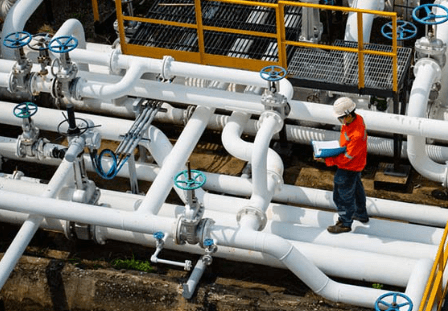Exploring The Role Of An Api 570 Certified Inspector In Process Piping Inspections

As someone interested in process piping inspections, you understand the crucial role they play in maintaining the safety and reliability of industrial operations. However, do you know about the critical role an API 570 certified inspector plays in this process?
In this article, we will explore the specific duties and responsibilities of an API 570 certified inspector and how their expertise ensures that processes run smoothly and safely.
To fully appreciate the importance of an API 570 certified inspector’s role in process piping inspections, it is necessary to first understand why these inspections are so vital. Process piping systems carry hazardous materials under high pressure, making them susceptible to leaks or failures that can result in catastrophic consequences.
Regular inspections ensure that any potential issues are identified quickly before they become major problems. By exploring the role of an API 570 certified inspector and their contribution to maintaining safe and reliable pipe systems, you will gain a more comprehensive understanding of the importance of process piping inspection.
Key Takeaways
– API 570 certified inspectors play a critical role in maintaining the safety and reliability of industrial operations through process piping inspections.
– API 570 certification requires meeting eligibility requirements, completing training requirements, and passing a 150-question exam, with recertification necessary to stay up-to-date with industry standards.
– Key skills and knowledge required for API 570 certification include inspection codes and standards, corrosion mechanisms, materials science, welding processes, and non-destructive testing (NDT) methods.
– Process piping inspections are crucial for ensuring the safety and reliability of industrial facilities and enable preventive maintenance, reducing downtime and improving operational efficiency.
Understanding the Importance of Process Piping Inspections
Process piping inspections are crucial for ensuring the safety and reliability of industrial facilities. These inspections help identify potential risks that can compromise the integrity of the entire system, leading to costly repairs or even catastrophic accidents.
The benefits of process piping inspections go beyond risk management; they also enable preventive maintenance, which reduces downtime and improves operational efficiency. An API 570 certified inspector plays a vital role in this process by conducting thorough assessments of process piping systems to ensure compliance with industry standards and regulations.
They have an in-depth knowledge of various testing methods and equipment used in inspecting pipes, including visual inspection, hydrostatic testing, and radiography. With this expertise, an API 570 certified inspector can provide valuable insights on how to maintain and optimize process piping systems for optimal performance.
Now let’s delve into what it takes to become an API 570 certified inspector.
API 570 Certification Overview
To become API 570 certified, you must meet the eligibility requirements, which include a combination of education and work experience.
The exam format consists of 150 multiple choice questions that test your knowledge on topics such as inspection procedures, corrosion mechanisms, and piping codes and standards.
Once certified, you must renew every three years by either retaking the exam or accumulating continuing education credits to recertify.
Eligibility Requirements
In order to become an API 570 certified inspector, one must meet certain eligibility requirements. These requirements include having a minimum of three years of experience in the design, fabrication, repair, or inspection of piping systems. Candidates should also have a high school diploma or equivalent and be able to provide proof of education and work experience.
Additionally, candidates must complete training requirements that cover topics such as code calculations and welding technology. They must also submit an application process that includes documentation of their education and work experience.
Once these eligibility requirements are met, candidates can move on to taking the API 570 certification exam which will test their knowledge on various aspects related to piping inspections.
Moving on from the eligibility requirements section, let’s now discuss the exam format and content.
Exam Format and Content
Get ready to tackle the API 570 certification exam format and content, which will challenge your knowledge on various aspects related to inspecting piping systems.
The exam is divided into two parts: a closed-book section with 50 multiple-choice questions, and an open-book section with 20 multiple-choice questions. You’ll have four hours to complete both sections, and you must score at least 70% in each section to pass.
The closed-book section includes questions on general knowledge of codes and standards, inspection methodologies, corrosion mechanisms, material properties and selection criteria, as well as types of defects commonly found in piping systems.
Meanwhile, the open-book section focuses on specific requirements for inspection planning and procedures based on API 570 code recommendations. To prepare for this challenging exam, it’s important to review the API 570 code thoroughly and use preparation techniques such as practice exams or study groups.
Moving onto the subsequent section about ‘renewal and recertification’, it’s essential to understand that maintaining your API 570 certification is equally important as passing the initial exam.
Renewal and Recertification
Maintaining your API 570 certification is crucial to keep your skills sharp and stay up-to-date with industry standards, allowing you to confidently inspect piping systems with ease. To maintain your certification, you must go through the recertification process every three years.
The recertification process includes passing a closed-book exam that covers updates in industry standards and regulations since your last certification, as well as any changes to API 570 specifications. In addition to the closed-book exam, there are continuing education opportunities available to help you prepare for the recertification process.
These opportunities include attending courses, seminars, or workshops related to process piping inspection or a related field. By participating in these activities, not only will you be able to meet the recertification requirements but also expand your knowledge and expertise within the field of process piping inspections.
With constant learning and dedication towards maintaining your certification status, you can excel in your role as an API 570 certified inspector. Transitioning into the subsequent section about the role of an API 570 certified inspector, it is important to note that being an API 570 certified inspector involves more than just having a certificate on paper. It requires extensive knowledge and experience in inspecting various types of piping systems.
The Role of an API 570 Certified Inspector
Being an API 570 certified inspector requires extensive knowledge and experience in process piping inspections. This enables the inspector to identify potential hazards and ensure compliance with industry standards. To obtain this certification, one must meet certain requirements set forth by the American Petroleum Institute (API), including a minimum of three years of experience in petrochemical or refining industries and passing a rigorous examination.
The benefits of hiring an API 570 certified inspector are numerous, as they possess the necessary skills to assess piping systems for damage, corrosion, and other defects that may lead to leaks or failures. As an API 570 certified inspector, you play a critical role in ensuring the safety and integrity of process piping systems. Your expertise is sought after by companies in various industries where these systems are used, such as oil refineries and chemical plants.
You must be knowledgeable in inspection techniques such as visual examination, ultrasonic testing, radiographic testing, magnetic particle testing, and liquid penetrant testing. In addition to technical skills, effective communication with clients is essential to understand their needs and provide accurate reports on inspection findings.
With this understanding of your role as an API 570 certified inspector established, let’s explore the key skills and knowledge required for this certification.
Key Skills and Knowledge Required for API 570 Certification
To become an expert in assessing potential hazards and ensuring compliance with industry standards, you’ll need to have a strong understanding of the key skills and knowledge required for API 570 certification. The API 570 exam preparation covers various areas such as inspection codes and standards, corrosion mechanisms, materials science, welding processes, and non-destructive testing (NDT) methods. As an aspiring inspector, you should be familiar with these topics and demonstrate proficiency through both theoretical and practical exams.
The benefits of API 570 certification are numerous. It not only enhances your credibility as a certified inspector but also increases your employability in the industry. Additionally, it provides opportunities for career advancement by allowing you to specialize in areas such as risk-based inspection (RBI) or fitness-for-service (FFS) assessments.
Ultimately, achieving API 570 certification signifies that you possess the necessary expertise to ensure process piping safety and reliability in accordance with industry standards.
In the next section, let’s explore some best practices for maintaining process piping safety and reliability without compromising on quality or efficiency.
Best Practices for Maintaining Process Piping Safety and Reliability
Ensuring the safety and reliability of industrial facilities requires implementing effective practices to prevent accidents and ensure compliance with industry standards. Process piping maintenance is an essential component in achieving these goals, as it helps identify potential issues before they become serious problems.
Regular inspections are necessary to detect signs of corrosion, erosion, and other forms of deterioration that can compromise the integrity of process piping systems. To maintain process piping safety, it’s also important to establish proper safety measures.
This includes ensuring proper ventilation and fire protection systems are in place, as well as training employees on how to properly handle hazardous materials and equipment. Additionally, regular audits should be conducted to identify any areas where improvements can be made in terms of safety protocols or equipment upgrades.
By prioritizing process piping maintenance and establishing a strong culture of safety within industrial facilities, companies can minimize downtime due to unexpected failures or accidents while also protecting their employees’ health and well-being.
Conclusion
Congratulations, you’ve now learned about the crucial role of an API 570 certified inspector in process piping inspections. Ensuring the safety and reliability of process piping systems is essential for the smooth operation of industrial processes. These inspections help identify potential issues before they become major problems, thus preventing accidents and downtime.
An API 570 certification is a mark of excellence that demonstrates an individual’s ability to perform process piping inspections at a high level. The knowledge and skills required to obtain this certification include a deep understanding of industry codes and standards, as well as experience working with different types of materials and equipment.
By following best practices for maintaining process piping safety and reliability, such as regular inspections and maintenance, you can ensure that your industrial processes run smoothly without interruption due to preventable issues.
By hiring an API 570 certified inspector, you can rest assured that your process piping system is in good hands. With their expertise and attention to detail, they can help keep your operations running smoothly while minimizing risk.




